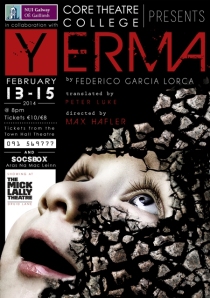Theatrecorp, which specialises in World Theatre Classics and adaptations is now planning its next production. Go to the link of Theatrecorp on this page to read something of the company history.
When Theatrecorp produced its seventh show, MEASURE FOR MEASURE, last year, it was the first show we had done where the show was created using the Chekhov Technique as the main plank of the rehearsal process. When I say this, I do not mean to say that it was the only way we created the work, but that it was the main theatrical language we used. In fact, I actually excluded very talented people who had had no experience with the Chekhov work, so keen was I to follow this through and use it as a directing process. The first week of this process is well documented in the Michael Chekhov Association newsletter 2014 which you can access by going to their website http://www.michaelchekhov.org so I am not going to go into too much detail here about the nuts and bolts journey of that initial exploration.
What are the drawbacks of using one technique? Might this be restrictive ? I would argue that all techniques have within them certain dangers when they are too solely and too rigorously applied, especially in ensembles where any inherent dangers in the technique are thereby multiplied by the practitioners. However, on the ‘plus’ side, one technique gives a company a basic common language with which to work, putting everyone on the same page and hopefully making powerful work.If you truly believe that theatre is a group endeavour, a technique common to all, at least in part, can only be positive.
Of course , everyone brings their own background and training to any play so that one technique and ensemble is also enriched by the sensibility, training and focus of every person in the room.
Professionally, however, this diversity is often a free-for-all in journeyman productions when actors and director collaborate for only one production,(a common scenario as we all know) because friction can arise through the different working processes of the director and the different actors. I can always remember one actor raging at another in a full rehearsal room ‘ I do not use your fucking technique,and don’t try and make me!’
As an aside, when I was auditioning actors in London, it was often possible to tell where a person had been trained from the way they performed their audition pieces. This is how profoundly technique and training affects your work. This might sound a bit grandiose, but it is very true that acting techniques are very much philosophies which are not just about how they ask us to look at theatre but how to look and react to the world in which we live.
For me, many method-type processes are by their very nature, inward-looking, ego-driven and materialist. They are very craft-driven, with the ‘actor’s tool box’, very much to do with being an effective worker in ‘the business’. Chekhov is much more concerned with the mystery of creation, and a refusal to simply reproduce photographic representations of ‘real life’. He also asserts the status of the actor as a creative artist, as opposed to an interpretive one.
As a director, the principal focus Chekhov offers to me is the shape of a production through his work on composition, exploring themes and polarities and working with atmosphere. Because Chekhov believed that atmosphere, was the ‘oxygen of a performance’ in which the characters lived and told their stories, to explore these general atmospheres thoroughly can only really be done through an ensemble which uses the technique. Exploring these atmospheres thereby gives a ‘score’ for the play, which all the participants can share as they work on their roles. This score can be alarmingly and magically different to any conceptions I as a director may have had at the start. And for me, that magic, for which I mean transformation, is what makes this way of working so special, producing surprising artistic choices.



